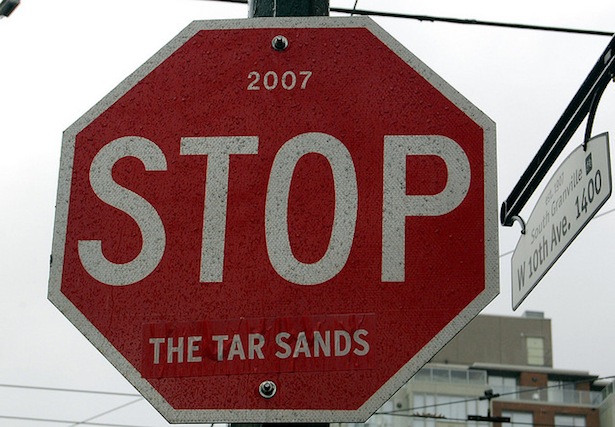
Last year was the hottest year on record in the United States, sparking climate justice activists to heat up their efforts and launch nearly a dozen campaigns across the country this summer. One of them is “Fearless Summer” — featuring direct actions and trainings aimed at stopping mountain top removal, the Keystone XL pipeline and the construction of the first-ever commercial tar sands mine in the United States, slated for operation in southern Utah.
Tar sands are viscous deposits of oil mixed with sand, clay and water that are difficult and energy-intensive to extract, requiring companies to inject chemicals and steam into the earth. Not only is the process itself harmful, but mining for additional oil in tar sands will increase global carbon emissions and accelerate climate change.
Given this dangerous proposition for southern Utah, the national environmental group Peaceful Uprising (sometimes abbreviated to Peace Up) is organizing a training camp this week as part of Fearless Summer for more than 100 local residents and environmental justice activists from across the country. The camp, held at the site of the proposed mine, has one simple goal: to stop the first commercial tar sands operation from coming in the United States.
Before the camp, Waging Nonviolence caught up with Peaceful Uprising director Henia Belalia to talk about the importance of the tar sands camp, what it means in the broader climate justice struggle, and what all of us must do to move towards sustainable lives.
So, let’s talk about the camp. There are 130 activists coming. Who are they?
We had region priority, so we first picked people who live in the region or in the state. We prioritized people who are working on tar sands, or who are committed to the campaign. Really we were looking for people who will respond and come out if there is a call to action.
I know the camp is a training camp for future action. So what do you see as the goal of this week?
I want people to hear stories, and share their stories. I want people to have an opportunity to deepen their analysis of climate justice, and for Peace Up’s analysis to grow, too. Networking is something I want to get out of this camp. People need to feel connected to each other. We also hope it will play a role in putting the Tar Sands mine in the broader climate justice movement.
This camp is the first ever action camp specifically for tar sands in Utah. It’s a big deal for climate justice organizers to have a full-length camp dedicated to one issue.
So as I said, we have been prioritizing frontline voices. Either people from frontline extraction communities, or people in the state of Utah who are already breathing the worst air in the nation. We know that extraction happening in southern Utah leads to the building of refineries in places like Salt Lake City. So it’s about that regional networking where folks from different states can come together and highlight the intersectionality of issues.
What organizations are spearheading the camp?
There’s two main groups, Canyon Country Rise and Peace Up. Ruckus Society has also been really supportive, and one of the co-directors is coming to attend the camp.
What sort of preparation have you been doing in the lead-up?
We have been getting people connected around in Salt Lake as well as in southern Utah. Salt Lake is where the refineries are going to be, which in turn pollute the air we breathe up here. We’re also keeping an eye out and we are waiting for them to break ground and start building. They have already started building the road.
Wait, really?
Yes, they have. Another thing we’ve been working on is bringing community members and people from the outside into the same room. There are skills that people have and the community doesn’t.
What are the challenges of organizing in such a rural area, especially in Utah?
That’s a good question: What does it look like to build resistance in a conservative state? What does it mean to build resistance in an isolated area? The key is knowing the land and knowing your area. It’s also about letting folks down in southern Utah know that we have their backs from Salt Lake all the way to New York.
Beyond the camp, what do you think needs to happen for the climate justice movement to “win”?
I think that it’s a paradigm shift. Right now there’s a big gap between the rich and poor, and that’s not okay. I think a win would mean local autonomy and local sovereignty.
We need to move towards a whole new way of living, and people need to be willing to sacrifice extreme comfort. That’s the thing for me: organizing ourselves in a different way socially. It’s about us finding out what it’s like to live on the planet with less, and in a more equitable way.
For me this work is spiritual, too. It needs to be. Man has to evolve on a really deep level. If we don’t evolve, we are not worth saving. If we keep killing people, keep abusing people, keep putting people in indefinite detention, keep torturing people — well, what is there to save?
